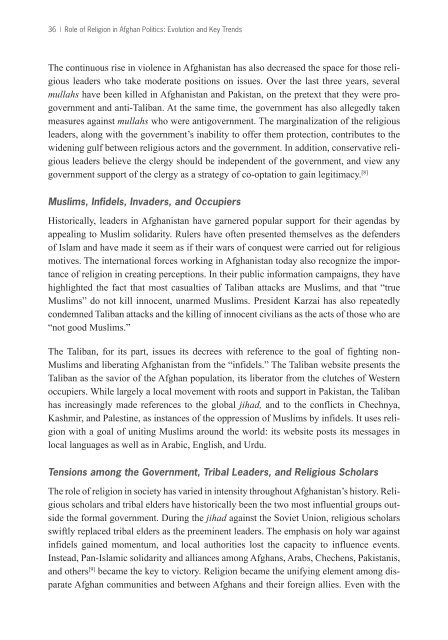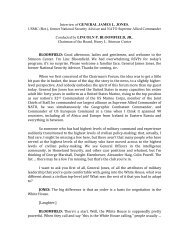Islam and Politics - The Stimson Center
Islam and Politics - The Stimson Center
Islam and Politics - The Stimson Center
Create successful ePaper yourself
Turn your PDF publications into a flip-book with our unique Google optimized e-Paper software.
36 | Role of Religion in Afghan <strong>Politics</strong>: Evolution <strong>and</strong> Key Trends<br />
<strong>The</strong> continuous rise in violence in Afghanistan has also decreased the space for those religious<br />
leaders who take moderate positions on issues. Over the last three years, several<br />
mullahs have been killed in Afghanistan <strong>and</strong> Pakistan, on the pretext that they were progovernment<br />
<strong>and</strong> anti-Taliban. At the same time, the government has also allegedly taken<br />
measures against mullahs who were antigovernment. <strong>The</strong> marginalization of the religious<br />
leaders, along with the government’s inability to offer them protection, contributes to the<br />
widening gulf between religious actors <strong>and</strong> the government. In addition, conservative religious<br />
leaders believe the clergy should be independent of the government, <strong>and</strong> view any<br />
government support of the clergy as a strategy of co-optation to gain legitimacy. [8]<br />
Muslims, Infidels, Invaders, <strong>and</strong> Occupiers<br />
Historically, leaders in Afghanistan have garnered popular support for their agendas by<br />
appealing to Muslim solidarity. Rulers have often presented themselves as the defenders<br />
of <strong>Islam</strong> <strong>and</strong> have made it seem as if their wars of conquest were carried out for religious<br />
motives. <strong>The</strong> international forces working in Afghanistan today also recognize the importance<br />
of religion in creating perceptions. In their public information campaigns, they have<br />
highlighted the fact that most casualties of Taliban attacks are Muslims, <strong>and</strong> that “true<br />
Muslims” do not kill innocent, unarmed Muslims. President Karzai has also repeatedly<br />
condemned Taliban attacks <strong>and</strong> the killing of innocent civilians as the acts of those who are<br />
“not good Muslims.”<br />
<strong>The</strong> Taliban, for its part, issues its decrees with reference to the goal of fighting non-<br />
Muslims <strong>and</strong> liberating Afghanistan from the “infidels.” <strong>The</strong> Taliban website presents the<br />
Taliban as the savior of the Afghan population, its liberator from the clutches of Western<br />
occupiers. While largely a local movement with roots <strong>and</strong> support in Pakistan, the Taliban<br />
has increasingly made references to the global jihad, <strong>and</strong> to the conflicts in Chechnya,<br />
Kashmir, <strong>and</strong> Palestine, as instances of the oppression of Muslims by infidels. It uses religion<br />
with a goal of uniting Muslims around the world: its website posts its messages in<br />
local languages as well as in Arabic, English, <strong>and</strong> Urdu.<br />
Tensions among the Government, Tribal Leaders, <strong>and</strong> Religious Scholars<br />
<strong>The</strong> role of religion in society has varied in intensity throughout Afghanistan’s history. Religious<br />
scholars <strong>and</strong> tribal elders have historically been the two most influential groups outside<br />
the formal government. During the jihad against the Soviet Union, religious scholars<br />
swiftly replaced tribal elders as the preeminent leaders. <strong>The</strong> emphasis on holy war against<br />
infidels gained momentum, <strong>and</strong> local authorities lost the capacity to influence events.<br />
Instead, Pan-<strong>Islam</strong>ic solidarity <strong>and</strong> alliances among Afghans, Arabs, Chechens, Pakistanis,<br />
<strong>and</strong> others [9] became the key to victory. Religion became the unifying element among disparate<br />
Afghan communities <strong>and</strong> between Afghans <strong>and</strong> their foreign allies. Even with the

















